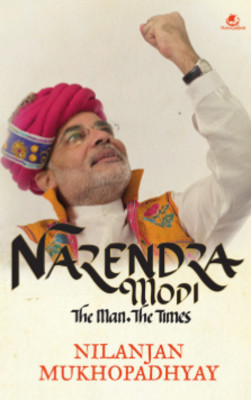These days in any article or news report on Narendra Modi, there has to be a statement about the acute polarization the man has caused in the society. The extreme reactions caused by the CM of Gujarat is unprecedented. The situation is like either you are with him or against. On one side many abhor him as the perpetrator of mass murder and a dictator in making. Others consider him a visionary, messiah of Gujarat and the only person capable of taking India forward. One natural aftermath of this is that readership of articles and books on Modi, for or against him has increased. Everyone are cashing in on this trend and are writing and publishing more on him. This, I think will explain the sudden demand of biographies on Modi.
Narendra Modi, The Man, The Times is an unauthorized biography by the journalist Nilanjan Mukhopadhyay. Though the author is a critic of Modi for events during and after Godhra riots, he has assured readers he will not be writing a prejudiced piece and the book will be rather an attempt to look into the mind of Modi in a balanced way. The book gives a historical background of the political ideology based on Hindutva that Modi believes and endorses. After that it describes the childhood of Modi, his education, how he was attracted to Sakha, joining in a tender age and then the ups and downs of his political career, which he has pursued after leaving his family, wife (?) and village, till 2012.
The book tries very hard to analyze the enigma about Modi through the interviews with him, his colleagues and adversaries, through countless media reports about him and observing his personal life and interests. The biography succeeds in making the reader acquainted to the personality of Narendra Modi. It gives a clear picture of political and social situations in Gujarat that lead to the ascend of Modi to power and his sustaining it. And to his credit, most of the times the author tries to balance his aversion to the ideology of Modi and Sangh Parivar and succeeds. There is no slandering, no sensationalization or mud stinging to be found in the 400 page book.
But there are some passages in the book, that can pose doubts to a careful reader. After organising Ekta Yatra, Modi was forced to stay away from Gujarat. Keshubhai Patel, then CM of Gujarat, as per the author was a total failure due to corruption and inefficiency. When the party decided to take him down, as per the author, Modi had pulled the strings. But there is nowhere mentioned any proof for it. There are times when the prejudice against Modi comes out in the most silly manner. Like, when detailing his routine, Modi claims himself a workaholic and says he sleeps only 4 hours a day. Author is quick to exclaim it is his hunger for power that makes Modi work hard! Another instance is the quick conclusion that Modi's childhood experience in acting on stage is the basis of his oratory skill and all that he does on stage is a carefully planned act.
One more peculiar aspect that I noticed while reading this book is that most of the criticisms quoted against Modi comes from his discontent ex-colleagues like Sanjay Joshi or Keshubhai Patel or some other source who wants to remain anonymous. While lot of criticism is heaped on Modi, quite convincingly by rival party members and media, Mukhopadhyay uses them sparingly. Is it part of the balancing act? Narendra Modi's biography by Nilanjan Mukhopadhyay is beneficial for readers who want to know more about this man who is grabbing headlines like no other politician in the country has ever done recently. I would recommend a little reading between the lines though.
*This post is not for or against Modi, its just about the book and what I felt after reading it.






























